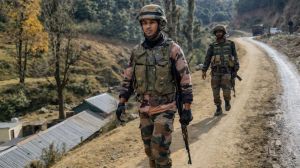Ice-breaker?
Prime Minister Manmohan Singh8217;s commitment to make Siachen a glacier of peace is entirely commendable. The very fact that he visited it...

Prime Minister Manmohan Singh8217;s commitment to make Siachen a glacier of peace is entirely commendable. The very fact that he visited it 8212; the first prime minister to do so 8212; signals his seriousness about its future. At least it drives home the point that Siachen is no abstraction, but a real conflict zone. And such recognition was the least our troops deserved. There is no doubt that an agreement on the glacier will give the India-Pakistan peace process new momentum. It will demonstrate that the two sides have the capacity for going beyond confidence building measures and set a new tone for their relationship. It would indeed be a matter of great pride for India if a day were to come when it would become unnecessary for India to sacrifice the lives of so many of its bravest soldiers to this inhospitable terrain. The prime minister was entirely right in aspiring to this future.
But India will have to find imaginative ways to reconcile three different considerations. The army has demanded an authentication of the border before a settlement takes place. It will also be keen that the eventual withdrawal of troops does not fritter away any of India8217;s strategic advantages gained at great cost in terms of human and financial resources. It would be inadvisable to conclude that India has no strategic investment in Siachen and the Eastern Karakoram Range. These two considerations will have to be reconciled with the desire to reach a settlement soon. It would be a mistake to think of opposing the strategic considerations to the peace process. It is in India8217;s and Pakistan8217;s interests that any settlement on Siachen leaves no room for future ambiguity or mischief. It should not be the sort of agreement that is easy to violate on the ground, should the hearts and minds of rulers change again. It is for this reason that retaining strategic advantage is of some importance. This is a way of ensuring that an agreement is self-enforceable, because the other side will find it materially and militarily costly to violate it.
Talks on Siachen have been subject to many false starts, and many verbal agreements have been stillborn. Therefore, even the new bonhomie between India and Pakistan will make an enduring and acceptable agreement difficult to achieve. India and Pakistan will have to find imaginative ways of addressing each other8217;s concerns about verification. Siachen is always described in superlatives: the highest battleground on earth, the longest running continuous military conflict between two regular armies, and the like. But there has never been a better time to divest this glacier of these dubious distinctions. It is of the utmost importance for the peace process that there is an agreement
on Siachen. But it is equally important that such an agreement be stable and successful.
- 01
- 02
- 03
- 04
- 05































